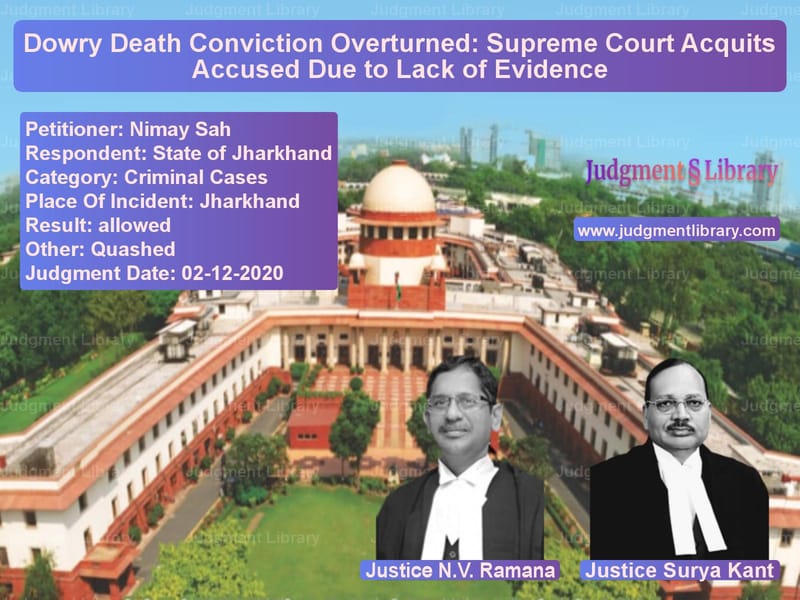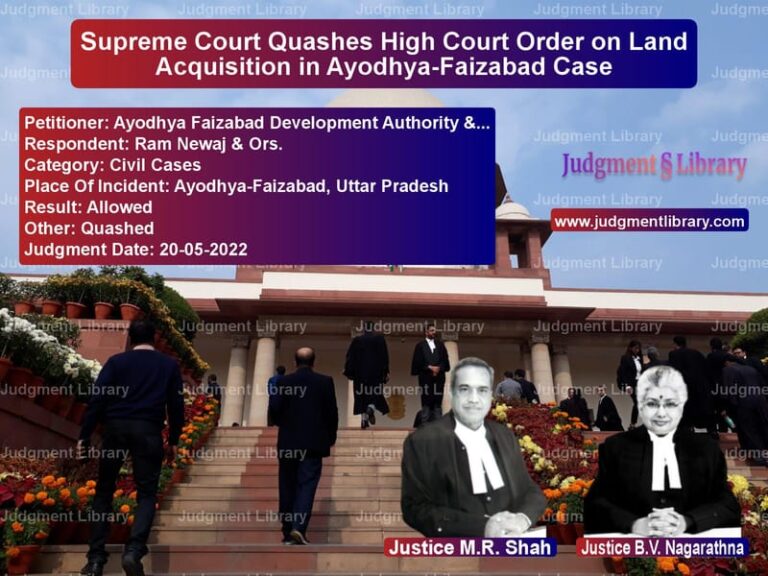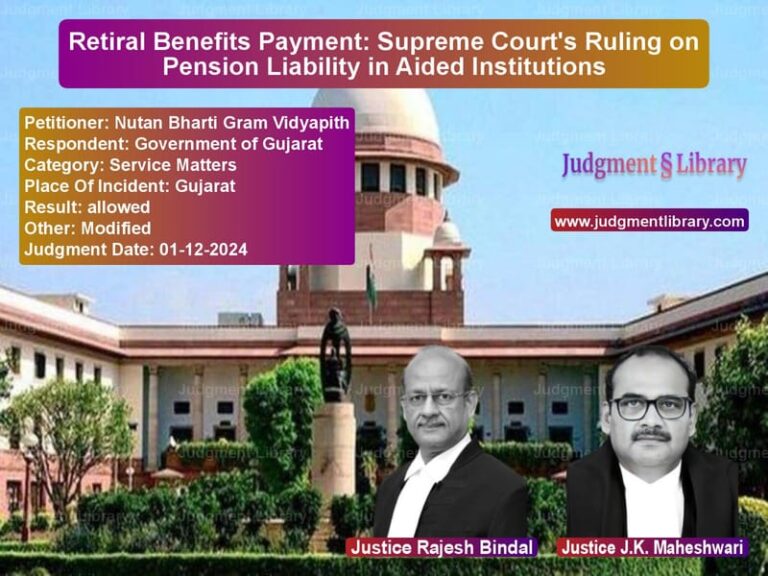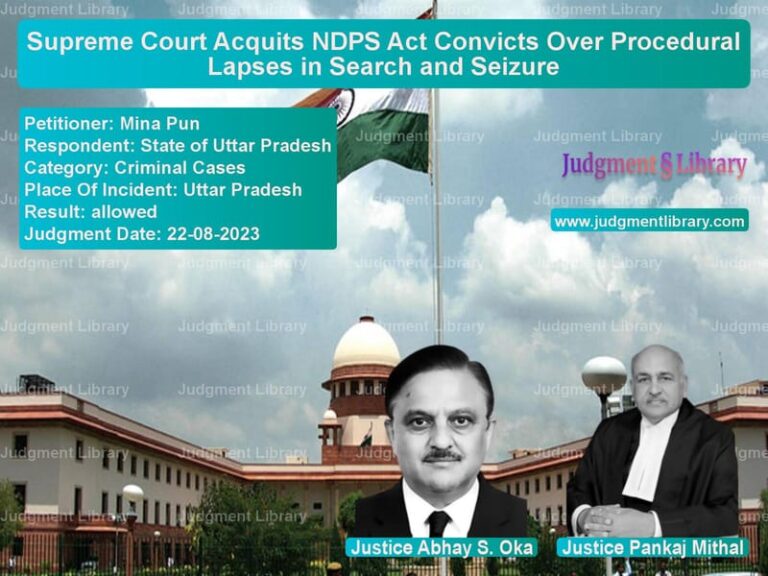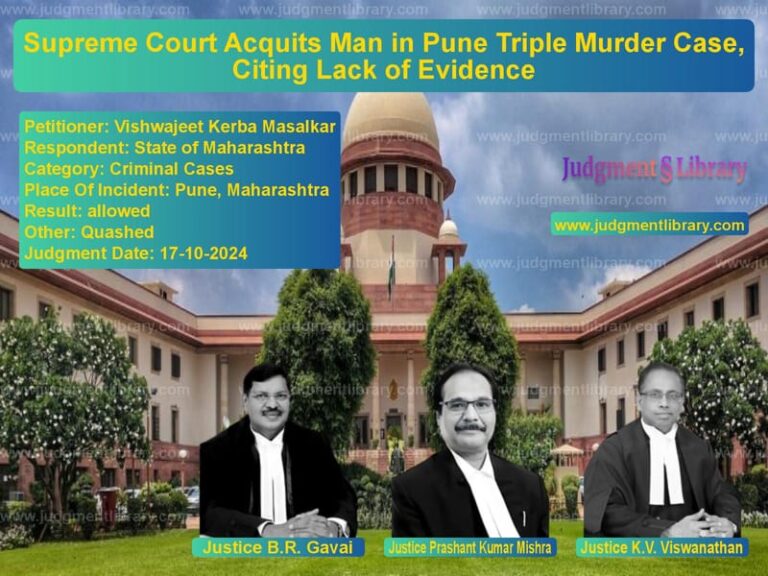Dowry Death Conviction Overturned: Supreme Court Acquits Accused Due to Lack of Evidence
The Supreme Court of India, in its landmark ruling in Nimay Sah vs. State of Jharkhand, set aside the conviction of the accused under Section 498A of the Indian Penal Code (IPC), citing insufficient evidence to establish cruelty or dowry harassment. The case, involving allegations of dowry demands, mental and physical harassment, and the mysterious death of the victim, raised critical questions about the burden of proof in dowry-related cases.
Background of the Case
The case revolved around the tragic death of Asha Kumari, who was married to Gora Sah. The prosecution alleged that Asha Kumari had been harassed for dowry, which ultimately led to her death under suspicious circumstances. The accusations against her husband, father-in-law, and brother-in-law (the appellant, Nimay Sah) included:
- Persistent dowry demands amounting to Rs. 10,000.
- Mental and physical harassment inflicted upon the deceased.
- Allegations that the accused contributed to circumstances leading to her unnatural death.
The trial court found the accused guilty under Sections 304B and 498A IPC, a decision that was upheld by the Jharkhand High Court. However, the Supreme Court, upon appeal, found the evidence presented by the prosecution insufficient to meet the required legal threshold.
Petitioner’s Arguments
The appellant, Nimay Sah, through his counsel, presented the following arguments:
- The prosecution’s case was based on uncorroborated statements that lacked material evidence.
- No independent witnesses provided testimony supporting the allegations of dowry harassment.
- The deceased had not left any direct communication or complaints against the accused.
- Generalized allegations of cruelty were insufficient for conviction under Section 498A IPC.
- The prosecution failed to establish a direct link between the alleged harassment and Asha Kumari’s death.
Respondent’s Arguments
The State of Jharkhand countered with the following submissions:
- The deceased’s family members had consistently testified about dowry harassment.
- The circumstantial evidence indicated that Asha Kumari was subjected to cruelty before her death.
- The burden was on the accused to explain the circumstances of her death since she was found dead near a canal, which suggested foul play.
- Despite contradictions, the testimonies of the deceased’s father and brother should be considered credible.
Supreme Court’s Observations
The Supreme Court, in its judgment delivered by Justices N.V. Ramana and Surya Kant, made several key observations regarding the evidentiary standards required to establish guilt under Sections 498A and 304B IPC.
1. Lack of Specific Evidence
The Court found that the prosecution’s case was primarily based on general allegations without specific instances of harassment.
“Apart from these vague allegations, no specific instance of hostile attitude or persistent demands of dowry have been pointed out by any of these witnesses.”
2. Inconsistencies in Witness Testimonies
The Court noted contradictions in the statements made by key witnesses:
“The testimonies of the prosecution witnesses do not establish the appellant’s direct role in the alleged harassment.”
3. Hostile Independent Witnesses
The Supreme Court observed that independent witnesses who could have corroborated the allegations had turned hostile, further weakening the prosecution’s case.
4. No Documentary Evidence of Harassment
The Court also considered the letters exchanged between the deceased and her family, which failed to mention any dowry-related issues.
5. Legal Standards for Conviction under Section 498A IPC
Reiterating the legal principles, the Supreme Court held:
“The ingredients of Section 498A IPC have not been proved against the appellant-accused beyond reasonable doubt.”
Final Judgment
- The Supreme Court set aside the High Court’s ruling.
- The conviction of Nimay Sah under Section 498A IPC was overturned.
- The appellant was acquitted of all charges.
- The bail bonds of the appellant were discharged.
Implications of the Judgment
This ruling has significant implications:
- Reaffirms the principle that conviction under Section 498A IPC requires specific and credible evidence.
- Protects individuals from wrongful allegations of dowry harassment.
- Strengthens the evidentiary requirements in cases related to marital cruelty.
- Prevents misuse of dowry laws by ensuring judicial scrutiny in allegations.
The Supreme Court’s judgment underscores the need for fairness in dowry-related cases and reinforces the principle that criminal law should not be used as an instrument of personal vendetta.
Petitioner Name: Nimay Sah.Respondent Name: State of Jharkhand.Judgment By: Justice N.V. Ramana, Justice Surya Kant.Place Of Incident: Jharkhand.Judgment Date: 02-12-2020.
Don’t miss out on the full details! Download the complete judgment in PDF format below and gain valuable insights instantly!
Download Judgment: Nimay Sah vs State of Jharkhand Supreme Court of India Judgment Dated 02-12-2020.pdf
Direct Downlaod Judgment: Direct downlaod this Judgment
See all petitions in Dowry Cases
See all petitions in Alimony and Maintenance
See all petitions in Domestic Violence
See all petitions in Judgment by N.V. Ramana
See all petitions in Judgment by Surya Kant
See all petitions in allowed
See all petitions in Quashed
See all petitions in supreme court of India judgments December 2020
See all petitions in 2020 judgments
See all posts in Criminal Cases Category
See all allowed petitions in Criminal Cases Category
See all Dismissed petitions in Criminal Cases Category
See all partially allowed petitions in Criminal Cases Category

